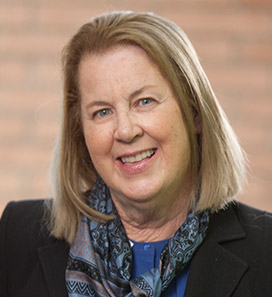
University Professor and AARP Chair in Gerontology Eileen Crimmins
University Professor Eileen Crimmins, who holds the AARP Chair in Gerontology at the USC Leonard Davis School, received the Provost’s Mentoring Award during the 2022 USC Academic Honors Convocation on April 19.
The annual award honors an individual faculty member “whose investment in and generosity toward the academic and professional success of other USC faculty, postdoctoral fellows, graduate students, or undergraduate students demonstrate exemplary mentoring,” per the award website.
“I have learned as much by mentoring the next generation of scholars as they have learned from me,” Crimmins said. “Mentoring has been the most fulfilling part of my career.”
Crimmins, a USC faculty member since 1982, is a world-renowned researcher in demography, socioeconomic differences in health, and global aging. She is the director of the USC/UCLA Center on Biodemography and Population Health, one of the Demography of Aging Centers supported by the U.S. National Institute on Aging, and has directed USC’s Multidisciplinary Research Training in Gerontology program since 2005.
In recent years, she has been elected to the American Academy of Arts and Sciences, listed as one of the world’s most influential scientific minds in social sciences by media and information firm Thomson Reuters, elected to both the Institute of Medicine and the National Academy of Sciences, received the Irene B. Taeuber Award from the Population Association of America, and received the Gerontological Society of America’s Robert W. Kleemeier Award for outstanding gerontology research. Her other USC honors include the Associates Award for Creativity in Research and Scholarship, being named a University Professor, and a USC mentoring award for her service to postdoctoral scholars and faculty.
In letters submitted in support of her nomination, current and former mentees credit her mentorship as key to their academic, research and professional success. They also described her kindness, her personal attention to mentees’ well-being, and her creation of a supportive and collaborative lab environment that strengthens each member’s individual abilities and productivity.
“It is simply impossible to overstate the role that Professor Crimmins plays in positively influencing the academic, research and professional successes of multiple generations of gerontology scholars who are now making vital contributions toward improving how people live and age,” said USC Leonard Davis Dean Pinchas Cohen. “Her long-term and all-encompassing commitment to helping others achieve their professional and scientific goals has helped to advance not just individual career trajectories but the field of gerontology as a whole.”





